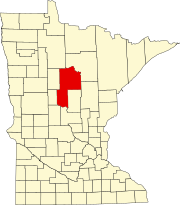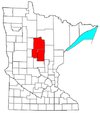Bena, Minnesota
Bena | |
|---|---|
 Big Winnie General Store | |
 Location of Bena within Cass County, Minnesota | |
| Coordinates: 47°20′26″N 94°12′22″W / 47.34056°N 94.20611°W | |
| Country | United States |
| State | Minnesota |
| County | Cass |
| Area | |
• Total | 0.51 sq mi (1.32 km2) |
| • Land | 0.51 sq mi (1.31 km2) |
| • Water | 0.01 sq mi (0.01 km2) |
| Elevation | 1,309 ft (399 m) |
| Population (2020) | |
• Total | 143 |
| • Density | 283.17/sq mi (109.33/km2) |
| Time zone | UTC-6 (Central (CST)) |
| • Summer (DST) | UTC-5 (CDT) |
| ZIP code | 56626 |
| Area code | 218 |
| FIPS code | 27-05104[3] |
| GNIS feature ID | 2394131[2] |
Bena (/ˈbiːnə/ BEE-nə)[4] is a city in Cass County, Minnesota, United States. The population was 143 at the 2020 census.[5] It is part of the Brainerd Micropolitan Statistical Area.
History
[edit]
A post office called Bena has been in operation since 1898.[6] Bena is a type of bird mentioned in the poem The Song of Hiawatha.[7] The Ojibwe word bina' is the word for partridge, a very common bird in this area.
Both the Big Fish Supper Club and the National Register of Historic Places listed Big Winnie General Store are landmarks associated with the city of Bena.
From 1901-1911, the Bena Boarding School, an American Indian residential school, operated in Bena.[8] Hundreds of Native American students were brought to the school.[9]
Late in World War II, a logging camp manned by prisoners of war was located at the site of an old CCC camp near Bena.[10] Two German POWs escaped from the camp in 1944 for a short period.[11]
Geography
[edit]According to the United States Census Bureau, the city has a total area of 0.50 square miles (1.29 km2), all land.[12] Bena is located along U.S. Highway 2 and Cass County Road 8.
Demographics
[edit]| Census | Pop. | Note | %± |
|---|---|---|---|
| 1910 | 179 | — | |
| 1920 | 205 | 14.5% | |
| 1930 | 145 | −29.3% | |
| 1940 | 319 | 120.0% | |
| 1950 | 331 | 3.8% | |
| 1960 | 286 | −13.6% | |
| 1970 | 169 | −40.9% | |
| 1980 | 153 | −9.5% | |
| 1990 | 147 | −3.9% | |
| 2000 | 110 | −25.2% | |
| 2010 | 116 | 5.5% | |
| 2020 | 143 | 23.3% | |
| U.S. Decennial Census | |||
2010 census
[edit]As of the census[13] of 2010, there were 116 people, 43 households, and 24 families living in the city. The population density was 232.0 inhabitants per square mile (89.6/km2). There were 60 housing units at an average density of 120.0 per square mile (46.3/km2). The racial makeup of the city was 19.8% White, 69.0% Native American, and 11.2% from two or more races. Hispanic or Latino of any race were 0.9% of the population.
There were 43 households, of which 37.2% had children under the age of 18 living with them, 18.6% were married couples living together, 20.9% had a female householder with no husband present, 16.3% had a male householder with no wife present, and 44.2% were non-families. 41.9% of all households were made up of individuals, and 16.3% had someone living alone who was 65 years of age or older. The average household size was 2.70 and the average family size was 3.79.
The median age in the city was 30.5 years. 32.8% of residents were under the age of 18; 8.6% were between the ages of 18 and 24; 22.5% were from 25 to 44; 23.3% were from 45 to 64; and 12.9% were 65 years of age or older. The gender makeup of the city was 48.3% male and 51.7% female.
2000 census
[edit]As of the census[3] of 2000, there were 110 people, 48 households, and 31 families living in the city. The population density was 218.0 inhabitants per square mile (84.2/km2). There were 72 housing units at an average density of 142.7 per square mile (55.1/km2). The racial makeup of the city was 24.55% White, 70.00% Native American, and 5.45% from two or more races.
There were 48 households, out of which 27.1% had children under the age of 18 living with them, 31.3% were married couples living together, 22.9% had a female householder with no husband present, and 35.4% were non-families. 33.3% of all households were made up of individuals, and 10.4% had someone living alone who was 65 years of age or older. The average household size was 2.29 and the average family size was 2.90.
In the city, the population was spread out, with 27.3% under the age of 18, 10.9% from 18 to 24, 19.1% from 25 to 44, 25.5% from 45 to 64, and 17.3% who were 65 years of age or older. The median age was 36 years. For every 100 females, there were 103.7 males. For every 100 females age 18 and over, there were 105.1 males.
The median income for a household in the city was $11,563, and the median income for a family was $6,563. Males had a median income of $17,083 versus $19,063 for females. The per capita income for the city was $7,619. There were 73.7% of families and 58.0% of the population living below the poverty line, including 95.0% of under eighteens and 26.7% of those over 64.
Education
[edit]This section needs expansion. You can help by adding to it. (August 2021) |
It is in the Cass Lake-Bena Schools district.[14]
The tribal K-12 school Bug-O-Nay-Ge-Shig School has a Bena address but is not in the city limits.[15]
References
[edit]- ^ "2020 U.S. Gazetteer Files". United States Census Bureau. Retrieved July 24, 2022.
- ^ a b U.S. Geological Survey Geographic Names Information System: Bena, Minnesota
- ^ a b "U.S. Census website". United States Census Bureau. Retrieved January 31, 2008.
- ^ "Minnesota Pronunciation Guide". Associated Press. Archived from the original on July 22, 2011. Retrieved July 4, 2011.
- ^ "Bena City, Minnesota". Census Data. Retrieved May 31, 2024.
- ^ "Cass County". Jim Forte Postal History. Retrieved April 12, 2015.
- ^ Upham, Warren (1920). Minnesota Geographic Names: Their Origin and Historic Significance. Minnesota Historical Society. p. 87.
- ^ "Interactive Digital Map of Indian Boarding Schools". The National Native American Boarding School Healing Coalition. Retrieved June 5, 2024.
- ^ "Paul Buffalo Biography -- Tim Roufs -- University of Minnesota Duluth". www.d.umn.edu. Retrieved June 5, 2024.
- ^ Pluth, Edward J. (Winter 1975). "Prisoner of War Employment in Minnesota During World War II" (PDF). Minnesota History. Minnesota Historical Society. p. 295. Archived (PDF) from the original on October 19, 2012. Retrieved June 20, 2014.
- ^ Lobdell, George H. (Fall 1994). "Minnesota's 1944 PW escape" (PDF). Minnesota History. Minnesota Historical Society. Archived (PDF) from the original on October 19, 2012. Retrieved May 5, 2017.
- ^ "US Gazetteer files 2010". United States Census Bureau. Archived from the original on July 2, 2012. Retrieved November 13, 2012.
- ^ "U.S. Census website". United States Census Bureau. Retrieved November 13, 2012.
- ^ "2020 CENSUS - SCHOOL DISTRICT REFERENCE MAP: Cass County, MN" (PDF). U.S. Census Bureau. Archived (PDF) from the original on August 11, 2021. Retrieved August 11, 2021.
- ^ "Bug-O-Nay-Ge-Shig School". Bureau of Indian Education. Retrieved August 11, 2021.
15353 Silver Eagle Drive NW, Bena, MN, 56626
- Despite the "Bena, MN" postal address, it is outside of the Bena city limis.


